状语从句1
- 格式:doc
- 大小:48.00 KB
- 文档页数:5
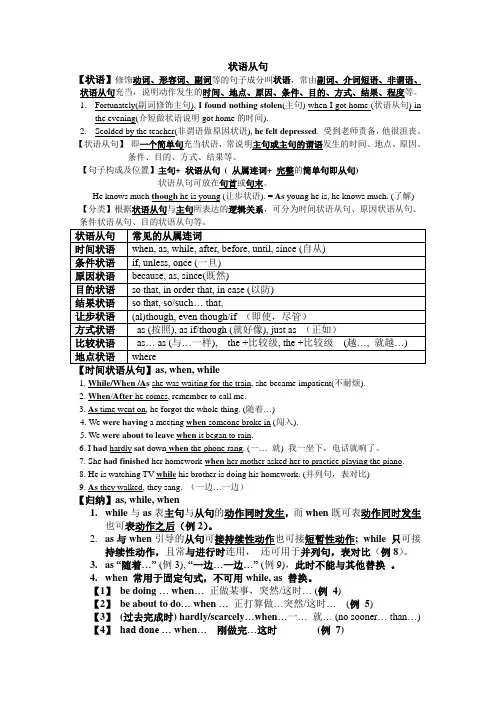
状语从句【状语】修饰动词、形容词、副词等的句子成分叫状语,常由副词、介词短语、非谓语、状语从句充当,说明动作发生的时间、地点、原因、条件、目的、方式、结果、程度等。
1.Fortunately(副词修饰主句), I found nothing stolen(主句) when I got home (状语从句) inthe evening(介短做状语说明got home的时间).2.Scolded by the teacher(非谓语做原因状语), he felt depressed. 受到老师责备,他很沮丧。
【状语从句】即一个简单句充当状语,常说明主句或主句的谓语发生的时间、地点、原因、条件、目的、方式、结果等。
【句子构成及位置】主句+ 状语从句( 从属连词+ 完整的简单句即从句)状语从句可放在句首或句末。
He knows much though he is young (让步状语). = As young he is, he knows much. (了解) 【分类】根据状语从句与主句所表达的逻辑关系,可分为时间状语从句、原因状语从句、1. While/When /As she was waiting for the train, she became impatient(不耐烦).2. When/After he comes, remember to call me.3. As time went on, he forgot the whole thing. (随着…)4. We were having a meeting when someone broke in (闯入).5. We were about to leave when it began to rain.6. I had hardly sat down when the phone rang. (一…就) 我一坐下,电话就响了。
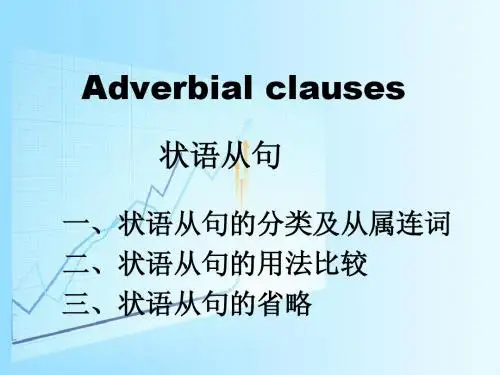
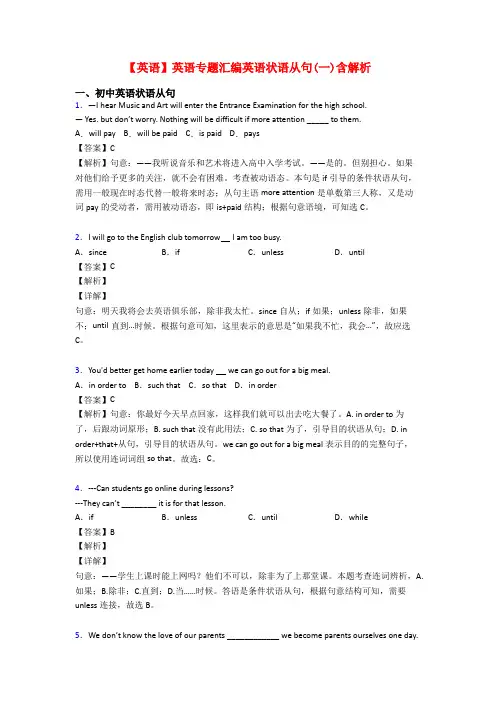
【英语】英语专题汇编英语状语从句(一)含解析一、初中英语状语从句1.—I hear Music and Art will enter the Entrance Examination for the high school.—Yes. but don’t worry. Nothing will be difficult if more attention _____ to them.A.will pay B.will be paid C.is paid D.pays【答案】C【解析】句意:——我听说音乐和艺术将进入高中入学考试。
——是的。
但别担心。
如果对他们给予更多的关注,就不会有困难。
考查被动语态。
本句是if引导的条件状语从句,需用一般现在时态代替一般将来时态;从句主语more attention是单数第三人称,又是动词pay的受动者,需用被动语态,即is+paid结构;根据句意语境,可知选C。
2.I will go to the English club tomorrow I am too busy.A.since B.if C.unless D.until【答案】C【解析】【详解】句意:明天我将会去英语俱乐部,除非我太忙。
since自从;if如果;unless除非,如果不;until直到…时候。
根据句意可知,这里表示的意思是“如果我不忙,我会…”,故应选C。
3.You'd better get home earlier today we can go out for a big meal.A.in order to B.such that C.so that D.in order【答案】C【解析】句意:你最好今天早点回家,这样我们就可以出去吃大餐了。
A. in order to 为了,后跟动词原形;B. such that没有此用法;C. so that为了,引导目的状语从句;D. in order+that+从句,引导目的状语从句。
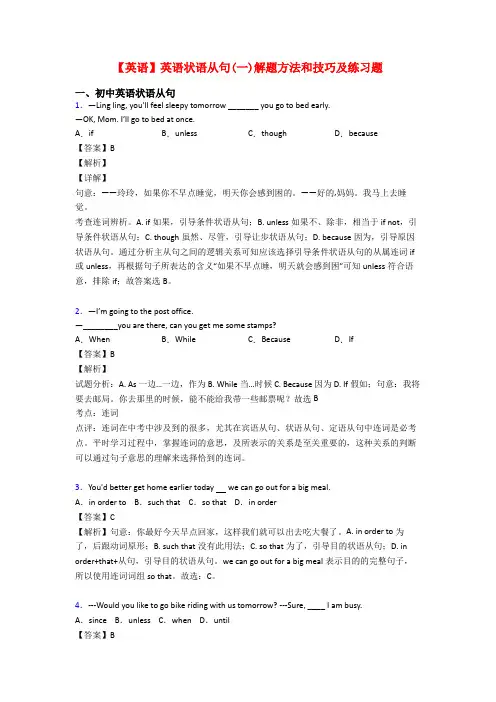
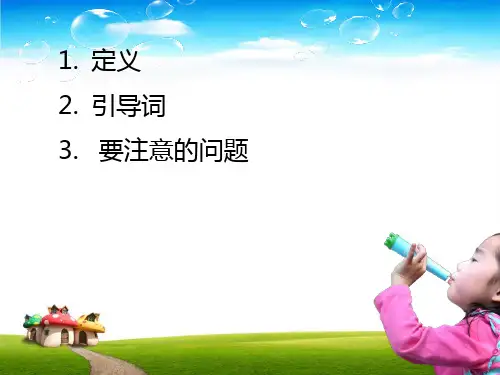
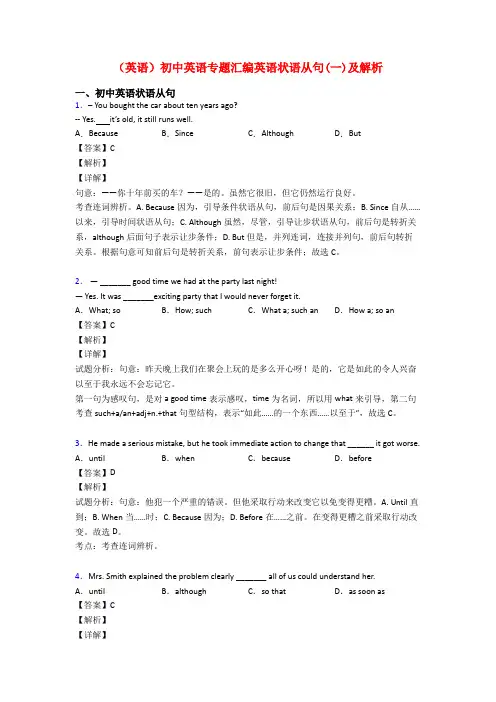
(英语)初中英语专题汇编英语状语从句(一)及解析一、初中英语状语从句1.– You bought the car about ten years ago?-- Yes. it’s old, it still runs well.A.Because B.Since C.Although D.But【答案】C【解析】【详解】句意:——你十年前买的车?——是的。
虽然它很旧,但它仍然运行良好。
考查连词辨析。
A. Because因为,引导条件状语从句,前后句是因果关系;B. Since自从……以来,引导时间状语从句;C. Although虽然,尽管,引导让步状语从句,前后句是转折关系,although后面句子表示让步条件;D. But但是,并列连词,连接并列句,前后句转折关系。
根据句意可知前后句是转折关系,前句表示让步条件;故选C。
2.— _______ good time we had at the party last night!— Yes. It was _______exciting party that I would never forget it.A.What; so B.How; such C.What a; such an D.How a; so an【答案】C【解析】【详解】试题分析:句意:昨天晚上我们在聚会上玩的是多么开心呀!是的,它是如此的令人兴奋以至于我永远不会忘记它。
第一句为感叹句,是对 a good time表示感叹,time为名词,所以用what来引导,第二句考查such+a/an+adj+n.+that句型结构,表示“如此……的一个东西……以至于”,故选C。
3.He made a serious mistake, but he took immediate action to change that ______ it got worse. A.until B.when C.because D.before【答案】D【解析】试题分析:句意:他犯一个严重的错误。
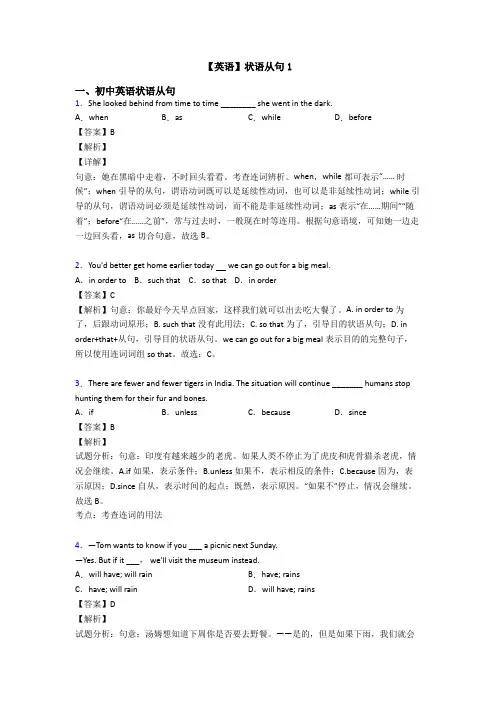
【英语】状语从句1一、初中英语状语从句1.She looked behind from time to time ________ she went in the dark.A.when B.as C.while D.before【答案】B【解析】【详解】句意:她在黑暗中走着,不时回头看看。
考查连词辨析。
when,while都可表示“…… 时候”;when引导的从句,谓语动词既可以是延续性动词,也可以是非延续性动词;while引导的从句,谓语动词必须是延续性动词,而不能是非延续性动词;as表示“在……期间”“随着”;before“在……之前”,常与过去时,一般现在时等连用。
根据句意语境,可知她一边走一边回头看,as切合句意,故选B。
2.You'd better get home earlier today we can go out for a big meal.A.in order to B.such that C.so that D.in order【答案】C【解析】句意:你最好今天早点回家,这样我们就可以出去吃大餐了。
A. in order to 为了,后跟动词原形;B. such that没有此用法;C. so that为了,引导目的状语从句;D. in order+that+从句,引导目的状语从句。
we can go out for a big meal表示目的的完整句子,所以使用连词词组so that。
故选:C。
3.There are fewer and fewer tigers in India. The situation will continue _______ humans stop hunting them for their fur and bones.A.if B.unless C.because D.since【答案】B【解析】试题分析:句意:印度有越来越少的老虎。
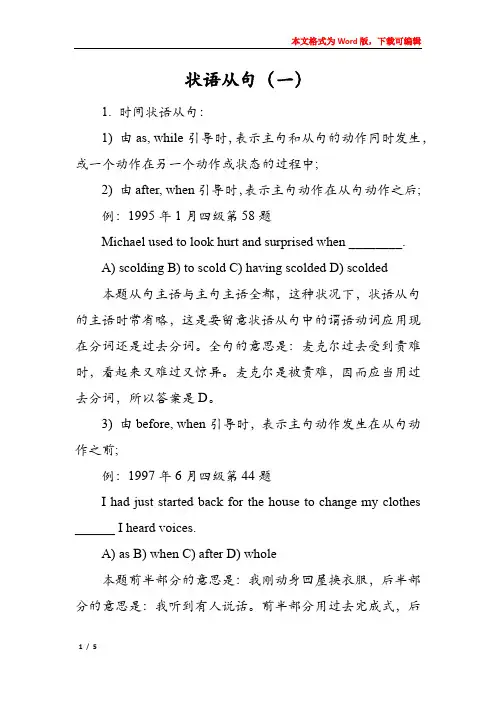
状语从句(一)1. 时间状语从句:1) 由as, while引导时,表示主句和从句的动作同时发生,或一个动作在另一个动作或状态的过程中;2) 由after, when引导时,表示主句动作在从句动作之后;例:1995年1月四级第58题Michael used to look hurt and surprised when ________.A) scolding B) to scold C) having scolded D) scolded本题从句主语与主句主语全都,这种状况下,状语从句的主语时常省略,这是要留意状语从句中的谓语动词应用现在分词还是过去分词。
全句的意思是:麦克尔过去受到责难时,看起来又难过又惊异。
麦克尔是被责难,因而应当用过去分词,所以答案是D。
3) 由before, when引导时,表示主句动作发生在从句动作之前;例:1997年6月四级第44题I had just started back for the house to change my clothes ______ I heard voices.A) as B) when C) after D) whole本题前半部分的意思是:我刚动身回屋换衣服,后半部分的意思是:我听到有人说话。
前半部分用过去完成式,后半部分用一般过去时。
前半部分的动作发生在后半部分之前。
为表达这一情景,前半部分作主句,主句中一般用just,hardly,后半部分作从句,用连接词when引出。
答案是B。
when从句可能表示多种意义,这里它表示一种原来没有预料到的新状况消失。
又是这一新状况打断了主句表示的正在进行的活动,或制止了即将发生的状况。
在这种状况下,主句常用进行式、完成式或be about +inf.之类。
我们来看下面的例题:例:1996年1月四级第45题I felt somewhat disappointed and was about to leave ______ something occurred which attracted my attention.A) unless B) until C) when D) while全句的意思是:我感到有些绝望,刚要离开时,发生了一件事,吸引了我的留意力。
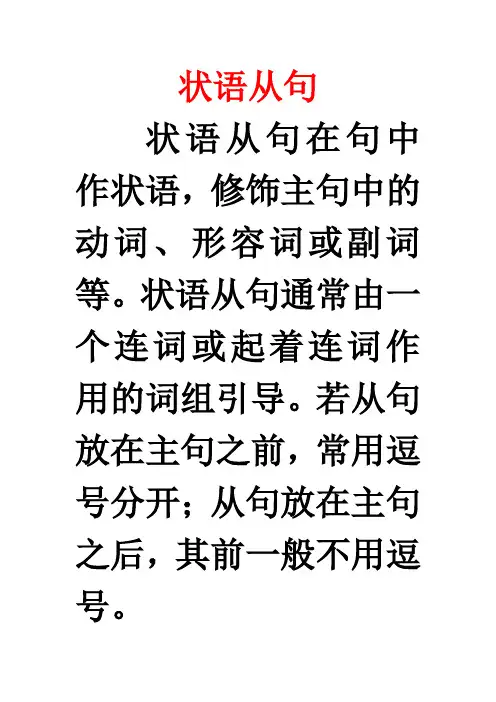
状语从句状语从句在句中作状语,修饰主句中的动词、形容词或副词等。
状语从句通常由一个连词或起着连词作用的词组引导。
若从句放在主句之前,常用逗号分开;从句放在主句之后,其前一般不用逗号。
状语从句根据所表达意思的不同,可以分为时间、地点、原因、目的、结果、方式、让步、比较、条件等各类,现分别叙述如下。
一、时间状语从句表示时间的状语从句常用when,while,after,since,as,until,once,as soon as,hardly…when, no sooner…than, the first time…, the second time…, every time…, each time…, the moment…, the minute…, 等来引导。
连词when,while,as都可表示“当……时”,其区别是用when 时,从句和主句的动作可以同时发生,也可以先后发生;用as,while 时则强调从句和主句的动作同时发生,从句的谓语常用进行时态,表示“随着”、“正当"、“一边……一边……”的意义。
例如:When it rains,I go to school by bus.下雨时,我坐公共汽车上学校。
As the pupils walked along the street,they sang happily.学生们一边沿着街道走,一边愉快地唱歌。
While we were watching TV,Comrade Zhang came in.我们看电视的时候,张同志进来了。
Since he entered the university,he has made great progress.他进大学以来,取得了很大进步。
二、地点状语从句表示地点的状语从句常用where,wherever等来引导。
例如:We should go where work conditions are difficult.我们应该到工作条件困难的地方去。
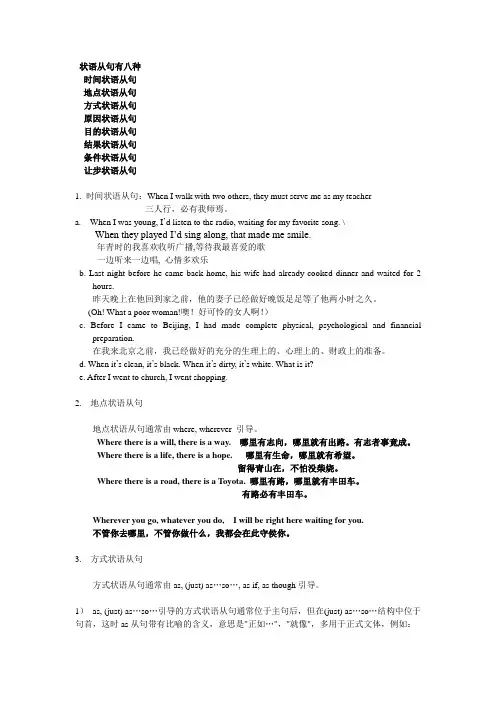
状语从句有八种时间状语从句地点状语从句方式状语从句原因状语从句目的状语从句结果状语从句条件状语从句让步状语从句1. 时间状语从句:When I walk with two others, they must serve me as my teacher三人行,必有我师焉。
a.When I was young, I’d listen to the radio, waiting for my favorite song. \When they played I’d sing along, that made me smile.年青时的我喜欢收听广播,等待我最喜爱的歌一边听来一边唱, 心情多欢乐b. Last night before he came back home, his wife had already cooked dinner and waited for 2hours.昨天晚上在他回到家之前,他的妻子已经做好晚饭足足等了他两小时之久。
(Oh! What a poor woman!噢!好可怜的女人啊!)c. Before I came to Beijing, I had made complete physical, psychological and financialpreparation.在我来北京之前,我已经做好的充分的生理上的、心理上的、财政上的准备。
d. When it’s clean, it’s black. When it’s dirty, it’s white. What is it?e. After I went to church, I went shopping.2. 地点状语从句地点状语从句通常由where, wherever 引导。
Where there is a will, there is a way. 哪里有志向,哪里就有出路。
有志者事竟成。
Where there is a life, there is a hope. 哪里有生命,哪里就有希望。
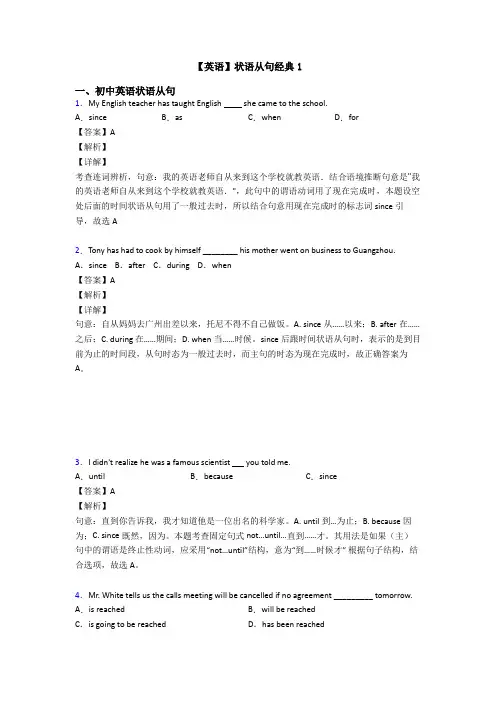
【英语】状语从句经典1一、初中英语状语从句1.My English teacher has taught English she came to the school.A.since B.as C.when D.for【答案】A【解析】【详解】考查连词辨析,句意:我的英语老师自从来到这个学校就教英语.结合语境推断句意是"我的英语老师自从来到这个学校就教英语.",此句中的谓语动词用了现在完成时,本题设空处后面的时间状语从句用了一般过去时,所以结合句意用现在完成时的标志词since引导,故选A2.Tony has had to cook by himself ________ his mother went on business to Guangzhou. A.since B.after C.during D.when【答案】A【解析】【详解】句意:自从妈妈去广州出差以来,托尼不得不自己做饭。
A. since从……以来;B. after在……之后;C. during 在……期间;D. when当……时候。
since后跟时间状语从句时,表示的是到目前为止的时间段,从句时态为一般过去时,而主句的时态为现在完成时,故正确答案为A。
3.I didn't realize he was a famous scientist you told me.A.until B.because C.since【答案】A【解析】句意:直到你告诉我,我才知道他是一位出名的科学家。
A. until到…为止;B. because 因为;C. since既然,因为。
本题考查固定句式not…until…直到……才。
其用法是如果(主)句中的谓语是终止性动词,应采用“not…until”结构,意为“到……时候才” 根据句子结构,结合选项,故选A。
4.Mr. White tells us the calls meeting will be cancelled if no agreement _________ tomorrow. A.is reached B.will be reachedC.is going to be reached D.has been reached【答案】A【解析】【详解】句意:怀特先生告诉我们,如果明天没有达成协议,电话会议将取消。
最新英语专题汇编英语状语从句(一)一、初中英语状语从句1.Our eyesight will become poorer and poorer we keep playing with phones.A.though B.unless C.if【答案】C【解析】【详解】句意:如果我们继续玩手机,我们的视力会越来越差。
A. though尽管,虽然;B. unless除非;C. if如果。
这里是if引导的条件状语从句,遵循主句用一般将来时,从句用一般现在时态,根据题意,故选C。
2.I have to leave now __ I can catch the last bus.A.so that B.because of C.until D.as soon as【答案】A【解析】试题分析:so that以便,所以;because of因为,由于;until直到;as soon as一……就……。
句意:为了赶上末班车,我现在必须离开了。
结合语境可知选A。
考点:连词辨析点评:连词在句子中主要起联系上下文的作用,他们之间的区别就是表示逻辑关系的不同,所以在解题时先要理解上下文含义,然后根据上下文逻辑关系选择合适的连词。
连词的用法都比较多,语义之间还有交叉,熟记其基本应用规则,了解其区别,注意固定搭配对象,是做好此类题型的关键。
3.— When did you go to bed last night?— ____________ I finished my homework.A.Until B.Not until C.When D.While【答案】B【解析】not …until 表示直到…才,与短暂性动词连用,故选B4.--- Do you know what time Daniel Xuzhou tomorrow?---At 2:00 p. m. I will meet him when he at the airport.A.gets to; arrives B.will get to; will arriveC.will get to; arrives D.gets to; will arrive【答案】C【解析】句意:——你知道丹尼尔明天什么时候去徐州吗?——下午2:00点。
状语从句(一)状语从句在复合句中作状语,修饰动词、形容词或副词等。
状语从句可以表示时间、条件、原因、地点、目的、结果、让步、方式、比较等意义。
各类状语从句连接词(短语)一览表:例:时间状语从句:Whenever he es, he brings a friend. 他每次来都带个朋友。
条件状语从句:As long as I am alive, I will go on studying. 只要我活着, 我就要学习。
原因状语从句:Since we live near the sea, we enjoy nice weather.由于我们住在海边,能享受到好的天气。
地点状语从句:Put it where we can all see it.把它放在我们都能看到的位置。
清单一、时间状语从句引导时间状语从句的连接词主要有when, while, as, by the time, before, after, since, till/until, as soon as 等。
1.连词when ,while 和as 都可表示当……时候,但用法有区别:(1)when ,while 都有“当……时候”的意思。
when 既可表示某一时间点,也可以表示某一段时间。
在when 引导的时间状语从句中,其谓语动词可以是延续性的,也可以是非延续性的,可与主句中的谓语动词同时发生,也可在其后发生。
语法考点 本讲内容第十讲状语从句(一)例:I was just reading a book when she came into my room. (came为非延续性动词)When the sun rises, the farmers work in the fields.(2)while 只能表示某一段时间,不能表示某一时间点。
在while引导的时间状语从句中,其谓语动词只能是延续性的,而且也只能与主句中的谓语动词同时发生或存在。
状语从句1,主系表句型----- be (连系动词do)2,主谓宾----- do(vt)3、主谓----- do(vi)----4,主谓宾补----do(vt)5,主谓宾宾---do(vt)6,There be (do)+ 主语+状语前面我们说过,定语是修饰名词的,定语从句放在名词之后;状语修饰动词,只要句子中出现动词就可以用状语来修饰,将这个状句变成一个be句型或do 句型就是状语从句。
例句:I played football carefully in the playground for the next competition on weekend主谓宾方式状语地点状语目的状语时间状语我周末为了下一次的比赛在草场上小心翼翼地踢足球。
小结:状语由副词和介词短语充当,中文把状语放在动词的前面,英文把状语放在动词的后面。
1、我周末为了赢得下一次的比赛在操场上小心翼翼地踢足球。
2、I played football in the playground on一、时间状语从句:1.由when, while, as引导的时间状语从句。
例如:When you think you know nothing, then you begin to know something.当你以为自己一无所知的时候,你就是在开始知道一些事物了。
Will我游泳的时候,请你照看一下我的衣服。
You can feel the air moving as your hand pushes through it.当你的手在空气中挥动的时候,你就能感觉到空气在流动。
①when有“突然”的意思,这是非常重要的考点。
We had dinner when someone knocked at the door .I walked in the stree when I met him②while有前后相反,前后形成鲜明对比的意思,翻译成“然而”,“虽然”等意思,这是非常重要的考点。
状语从句(1)九-高一讲义(4)状语从句修饰动词、形容词、副词或整个句子,说明动作或状态特征的句子成分,叫做状语。
时间状语从句地点状语从句原因状语从句条件状语从句状语从句让步状语从句结果状语从句目的状语从句方式状语从句比较状语从句一.时间状语从句when,while,as,immediately,directly,instantly,the moment,the minute, as soon asuntil,till,since,before,after,once,every time, hardly..when, no sooner... than,1.when 的用法①when可用来引导时间状语从句,意为“当……的时候”从句的谓语动词可以是延续的,也可以是短暂的。
如:When the film ended, they went back.When I lived there, I used to go to the seashore on Sundays.②When 常用于下列句式:意为“就在那时”。
如:was doing something…whenwas about to do…whenwas on the point of doing sth... when…had done…when③when可以表“既然”,如:How can I help them to understand when they won’t listento me?2. while的用法①while可用来引导时间状语,意为“当……的时候”;引导的动作必须是持续性的,如:Please don’t talk so loud while others are working.②while作为并列连词,意为“而,却”,表示对比。
Jane was dressed in brown while Mary was dressed in blue.③while也可用来引导让步状语,意为“尽管,虽然”;可表示尽管,相当于althoughWhile I admit that the problems are difficult , I don’tagree that they can’t be solved.④趁…的情况赶紧做, 否则来不及了Strike while the iron is hot.3. as的用法①as可用来引导时间状语,意为“一边…一边”;随着如:She sang as she walked home all the way. (一边…一边)She was doing her homework as she was listening to the music.As she grew older, she became more beautiful. (随着)②as也可用来引导原因状语从句意为“因为”;如:As she is free today, she would like to do some shopping.③as还可用来引导让步状语从句(通常用倒装结构)意为“尽管”。
【英语】中考英语专题汇编英语状语从句(一)及解析一、初中英语状语从句1.He has made great progress his mother is very pleased with him.A.so;that B.enough;to C.so;too D.such;that【答案】D【解析】【详解】句意:他已经取得了如此大的进步以至于他的妈妈对他非常满意。
从句意可知这里需要用到“如此….以至于”so+形容词/副词+that或such+名词+that,根据句子中的great progress意思是很大的进步,是名词短语,故用such…that, 故选D。
2.---The two old friends were ____ busy ____ with each other that they forgot the time.---Yes. They hadn’t met for over ten years, so they kept talking the whole night.A.too; to talk B.too; talking C.so; to talk D.so; talking;【答案】D【解析】试题分析:句意:这两个老朋友那么忙于交谈以至于忘了时间。
是。
他们十年多没见到了,所以他们聊了一晚上。
考查句式so…that…因此……以至于……;be busy doing忙于做……,故选D。
考点:考查so…that句式。
3.--- Do you know what time Daniel Xuzhou tomorrow?---At 2:00 p. m. I will meet him when he at the airport.A.gets to; arrives B.will get to; will arriveC.will get to; arrives D.gets to; will arrive【答案】C【解析】句意:——你知道丹尼尔明天什么时候去徐州吗?——下午2:00点。
状语从句11.____ there is a will, there is a way.a. Thoughb. Wherec. Whiled. Even if2.Strike_____ the iron is hot. a. before b. till c. while d. so3.____ they arrived there, they started to work at once.a. Afterb. Whilec. Asd. Though4.He won’t believe it____ he sees it with his own eyes.a. beforeb. afterc. untild. as soon as5.____ you came to visit me, I was reading. a. As b. After c. Before d. When6.People do not know the value of health____ they lose it.a. whileb. whenc. untild. as7.The climate here is_____ of Kunming.a. as good as climateb. better thanc. as good as thatd. better than the one8.China has a larger population_____.a. than that of Americab. than Americac. as Americad. than American9.He succeeded in solving all the problems______.a. as expectedb.as expectingc. than expectedd. than expected10.The radios made in our factory are better than____ made in theirs.a. thatb. thosec. whatd. these11.It’s nicer to go with someone____.a. as going homeb. as to go homec. than going aloned. than to go alone12. This room is____ than the last one you showed me.a. as suitableb. a bit suitablec. a lot suitabled. less suitable13.They walked____ the station.a. so far asb. as far asc. just asd. as farther as14.____I know, this book will be used as a text book.a. So far asb. So farc. So longd. As to15.____ the weather was fine, I opened all the windows.a. Asb. Forc. Becaused. Since that16.____he was ill yesterday , Tom didn’t go to school. a. As b. Since c. For d. Because17.____the earth is round, why do we not fall off? a. Because b. As c. Since d. For18.It must have rained last night, ____the ground is wet. a. as b. for c. since d. because19.The day breaks, ____ the birds are singing. a. because b. as c. since d. for20.He made____ fire that the room was quite warm.a. so bigb. such bigc. so big ad. such big a21.It was____ that he couldn’t finish it by himself.a. such difficult workb. so difficult a workc. such a difficult workd. so difficult work22.Bill had___ many falls___ he got black and blue all over.a. such, thatb. so, asc. as, asd. so, that23.I’ll leave him a note___ he’ll know where we are.a. so thatb. in orderc. thatd. for24.The result of the experiment was not satisfactory, ____ we decided to make another one.a. orb. soc. ford. and25.She made a note of it____ she might forget. a. so that b.if c. in case d. in order that26.____ he finished his supper, he went out to play.a. As forb. As long asc. As well asd. As soon as27.____ he opened the window, a sparrow flew in.a. Thoughb. The momentc. Ifd. Unless28.No sooner had he seen a blind man____ he got up from his seat.a. thanb. whenc. sod. then29.Hardly had he sat down___ the phone rang again. a. when b. than c. then d. and30.Scarely had he gone out____ it started to snow. a. that b. than c. when d. and31.The new secretary is supposed to report to the manager as soon as she_____.a. will arriveb. arrivesc. is going to arrived. is arriving32.____ the professor had left, everyone looked relaxed.a. Whileb. Afterc. Unlessd. For33.I’ll give him your message____ he come here.a. beforeb. unlessc. asd. the minute34.He is____ busy man that he really needs a secretary. a. so b. so a c.such d. such a35.John was____ tired that he went to bed immediately after dinner.a. sob. veryc. tood. such36.----Did you catch the first bus this morning ?----No, it had left the stop____ I got there.a. as soon asb. at that timec. by the timed. during the time37.Nobody believes him___ what he said.a. even thoughb. in spitec. no matterd. contrary to38. We must get up early tomorro w___ we’ll miss the first bus to the Great Wall.a. sob. orc. butd. however39.We know nothing about him____ he is an American.a. besidesb. butc. andd. except that40.Tired___ he was, I decided not to trouble him. a. unless b. even if c. although d. as41.He will come to call on you the moment he____ his painting.a. will finishb. finishedc. has finishedd. had finished42.We had scarcely arrived there____ it began to rain. a. since b. before c. than d. that43.____ he worked all day, he couldn’t finish the job.a. Althoughb. Evenc. In cased. In spite44._____, the football game has been decided not to put off.a. Heavily as did it rainb. As it rained heavilyc. Heavily as it rainedd. As heavily as it rained45.___many times , but he still couldn’t understand it.a. Having been toldb. Though had been toldc. He was toldd. Having told46.He was about to go to bed____ the door bell rang. a. as b. when c. while d. and47.She married him____ tend and comfort him.a. in orderb. in order for thatc. in order that she mayd. in order that she might48.It was____ he was ill that he didn’t go with us. a. as b. since c. because d. /49.He almost knocked me down____ he saw me. a. before b. as soon as c. hardly d. till50._____, he was a storekeeper and a postmaster.a. As a boyb. When a boyc. As was a boyd. When was a boy51.Go back____ you come from. a. where b. wherever c. until d. unless52.____ you find either his address or his telephone number, you can’t get in touch with him.a. Ifb. Exceptc. Withoutd. Unless53.It was already eight o’clock____ we got home. a. which b. until c. since d. when54.You are always welcome___you call on me. a.whatever b.however c.whenever d.whoever55.____, he has to help support the family.a. Though he is childb. A child as he isc. Child as he isd. While he will come56.____ tomorr ow, I’ll ask him where he has been.a. When he comesb. While he comesc. When he will comed. While he will come57.His father is___ than his mother.a. a little oldb. a little olderc. very oldd. very older58.Sometimes the more you tell him, _____.a. less notice he will takeb. the less notice he takesc. the little notice he takesd. the least notice he takes59.Linda used my bike freely____ it belonged to her. a. as if b. so that c. if d. like60.____, Tom can never catch up with Jack in English study.a. No matter ever whatb. Whatever no matterc. No matter ever whatd. No matter what61._______, Tom can never catch up with Jack in English study.a. However he tries hardb. No matter how hard he triesc. No matter how he tries hardd. As hard he tries62.Anyone can borrow books from the library____ he has library card.a. so long asb. sincec. even thoughd. unless63.There was____ much water on the floor of the classroom_____ the students could not go in.a. such, thatb. no, andc. so, thatd. such, and64.Children need education____ they need air and water.a. becauseb. whenc. sinced. just as65.My brother does not study so hard____ yours. a. that b. as c. like d. than66.Li Ping swims____ Zhang Hong_____.a. as good as, doesb. so good as, isc. as well as, doesd. so well as, is67.No one can be more fit for his office_____.a. as he isb. as he doesc. than he isd. than he does68.____ you begin, you must continue. a. Before b. Since c. As d. Once69.____your daughter hasn’t come back, let me take you to the hospital.a. Whenb. Thatc. Ford. Since70.It was not long____ the news spread out. a. since b. before c. until d. when71.Only___ he had discovered his mistake did he apologize to you.a. whenb. thatc. since b. by72.His classmates no longer laughed at him____ they used to.a. as thoughb. likec. just asd. as73.I’d like to go swimming____ the water is not too cold.a. forb. sincec. ifd. whether74.Let’s start earlier____ we can get there in time. a. as if b. so c. even if d. so that75.Please look after the children for me____ I am out. a. while b. what c. though d. so that76.____ he was sleeping , they stole his clothes. a. While b. After c. Before d. Until77.I don’t think you’ll be able to understand that____ you are my age.a. evenb. only whenc. as ifd. even when78.____ he said he wasn’t hungry , he ate the big breakfast.a. Evenb. Unlessc. Inspited. Although79. There are so many people in the room____ we can’t get in.a. thoughb. even ifc. thatd. if80. We have been to the factory twice____ it was set up in 1992.a. beforeb. sincec. whend. for81. They hurried so that they___ the train.a. do not missb. had not missedc. will not missd. might not miss82.He didn’t review his lessons, ____ he didn’t pass the text.a. becauseb. sincec. even thoughd. so that83. He stepped into the room slightly ____ he might wake up the sleeping baby.a. so thatb. in order thatc. in cased. so84.____ happens, I’ll stand on your side.a. Howeverb. Wheneverc. Whereverd. Whatever85.He goes there____ he has time, which is not often.a. wheneverb. whereverc. howeverd. whatever86.____you are well again, you can go on with your work.a. Even thoughb. Now thatc. Every timed. For87.____ I meet him, he wears sunglasses. a. If b. Every time c. As soon as d. Although88.Those college students will go____ they are needed after graduation.a. to placeb. whereverc. to whered. no matter where89.You m ust tell the truth, ____ I won’t help you. a. and b but c. or d. if90.The plane won’t take off____ the wind stops blowing.a. asb. afterc. whiled. unless91.I might go shopping this afternoon. ____ I go shopping I’ll buy some foo d.a. Andb. Orc. Ifd. When92.Think hard, ____ you’ll get a good idea. a. but b. / c. and d. yet93.It’s a long time since I enjoyed myself. This sentence means_____.a. I enjoyed myself for a long timeb. I haven’t e njoyed myself for a long timec. I went to enjoy myselfd. What a long time after I enjoyed myself94._____, Mother will wait for him to have dinner together.a. However late is heb. However late he isc. However is he lated. However he is late95.After the war, a new school building was put up____ there had once been a theatre.a. thatb. whenc. whichd. where96.If we work with a strong will, we can overcome any difficulty, ____ great it is.a. whatb. howc. howeverd. whatever97.Mother was worried because little Alice was ill especially____Father was away in France.a. asb. thatc. duringd. if98.The sooner we leave, ______.a. the earlier we will reach the stationb. the earlier will we reach the stationc. we will reach the station earlierd. the more earlier will we reach the station99._____ he said he was our friend, _____ he would not help us.a. Since, andb. As, becausec. Though, yetd. Though, but100._____ you are free tonight, _____ not drop in and play chess with me ?a. Because, dob. Since, whyc. For, andd. As, but101.I’ve never spoken ill of her, ____ I don’t like her. a. if b. because c. so that d. though 102.It seemed only three minutes____he got everything ready.a. before b . after c. till d. as103.Fewer visitors invited by him came____ I expected. a. as if b. so that c. as d. than 104._____ there are schools and colleges, there are examinations.a. Whereverb. Wherec. Wheneverd. When105._____ they are, they are friendly and kind to others.a. Poverty asb. Poor thoughc. Poorly asd. Although poor106.The two boys look so much alike____ no one can tell them apart.a. andb. asc. thatd. so that107.----Why was the price of bread so high that year ? -----________ the war broke out.a. Asb. Sincec. Ford. Because108.The earth goes around the sun____ the moon goes around the earth.a. so thatb. just likec. just asd. as how109.We do not necessarily grow wiser____ we grow older. a. as b. than c. that d. before 110.It will not be long____ we can have a trip to the moon.a. thatb. afterc. untild. before111.It’s almost three years____ I saw her last time. a. that b. after c. since d. when 112.We will not fail in the football match____ we practise hard from now on.a. as long asb. unlessc. in cased. though113.----Will you go to attend her birthday party ? ----No, _____ invited to.a. ifb. whenc. even thoughd. until114.It was not_____ she took off her dark glassed____ I realized she was a famous star.a. when, thatb. until, thatc. until, whend. when, when115.The children were enjoying their dinner____ a stranger knocked at the door.a. thenb. whilec. asd. when116.He seldom comes here. ____ he comes, I’ll let you know.a. Onceb. Asc. Unlessd. While117.Please put back the bike____ it was and locked it. a. that b. where c. which d. there 118.He waved us in the distance____ I could see him easily.a. now thatb. so thatc. unlessd. even though119.You can go out____ you promise to be back before ten o’clock.a. ifb. unlessc. whend. if not120.____ he happens to be, Peter can make himself at home.a. Wheneverb. Whereverc. Whoeverd. Whichever。